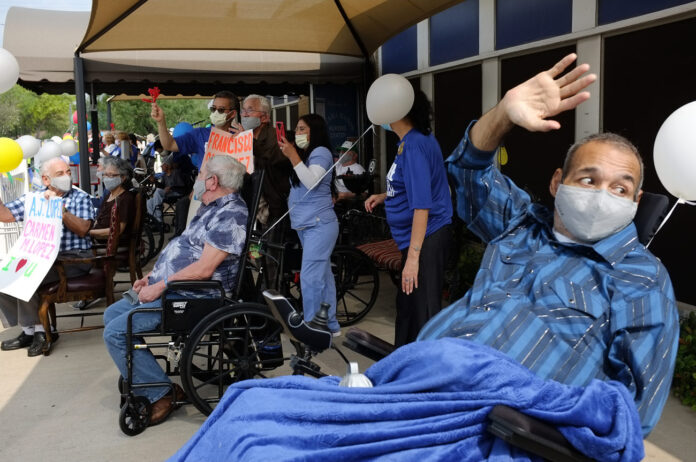BY MATT WILSON AND BERENICE GARCIA
EDINBURG — Gabe Lopez traveled about 300 miles from his home in Austin to stand several feet away from his parents and talk to them briefly outside the nursing home where they reside here Friday morning.
He couldn’t hug them. He couldn’t spend much time with them. He couldn’t do any of the things a son should expect to do with his parents.
Nevertheless, seeing his parents in person for the first time since January was priceless.
“I got a little choked up,” Lopez said. “It was great seeing them. I think a lot of it is just relief, knowing that they’re safe in the nursing home. Safe from the virus.”
Like nursing home residents across the nation, Lopez’s octogenarian parents have been cut off from the outside world to the greatest degree possible in an effort to protect them from the coronavirus. Nursing homes and retirement centers elsewhere have been turned into charnel houses when a patient or staff member tests positive for the virus, ripping through the at-risk residents and leaving horrific tallies of fatalities.
Nursing homes have proved to be a weak point locally, as well. Almost two-thirds of COVID-19 fatalities in the Rio Grande Valley have been tied to two nursing homes in Harlingen.
Lopez says being separated from his parents is a small price to pay for knowing that they’re being kept secure.
“I’m glad that they’re locked down right now. Sure, I may not be able to hug them or give them a kiss, but they’re safe,” Lopez said. “When everybody was doing the panic buy, I was glad that they didn’t have to deal with that either.”
Retama Manor Nursing Center, where Lopez’s parents live, held a parade Friday morning, inviting families and first responders to drive by and give the cloistered residents a wave in recognition of the center’s 50th anniversary.
Lopez and his sister woke up early Friday morning, decorating posters and decking out their car with balloons and streamers. They lined up by the H-E-B down the road from Retama and joined the procession of cars and firetrucks, circling the center three times.
“All the residents who were able to be outside, they got a kick out of it.” Lopez said. “I appreciate that, because it got my parents out into the fresh air and I got to see them.”
Afterwards, Lopez and his sister got out of their car and spoke to their parents for a while, staying a good distance away. Retama does daily Zoom calls with residents’ families and Lopez is able to keep in touch with his father, but his mother suffers from dementia and he’s not able to communicate with her long distance.

“It’s tough not being able to actually interact with them,” he said, ‘but what keeps me going is that they’re safe.”
Steps have been taken to keep nursing home residents like Lopez’s parents safe. Masks and personal protective equipment have become commonplace, along with social distancing measures and temperature checks. Earlier this week, Gov. Greg Abbott announced the state would test every nursing home resident in Texas.
Roy Zepeda, Retama’s administrator, said it’s not clear to him exactly how that will work just yet.
“We’re still waiting on our marching orders on that, but we understand that it’s going to happen here in the next 10 days to two weeks,” he said.
Some nursing home residents will get tested as early as Saturday, announced Elizabeth Cuevas, the health emergency preparedness and response manager for Region 11 of the Texas Department of State Health Services.
Region 11 encompasses 19 counties in South Texas, from north of Corpus Christi to Laredo and down to Brownsville.
DSHS is partnering with the Texas Division of Emergency Management and the Health and Human Services Commission to fulfill the goal of testing all nursing home residents and staff in the state.
As of Friday morning, Cuevas said they’ve scheduled their first nursing home testing in Region 11, which will be Saturday.
“We’re very aggressively looking at how we can support nursing homes,” Cuevas said. “One of our jurisdictions, Laredo, had a very brilliant plan on how they were going to support testing in their own jurisdiction and so we’re trying to build off the strength of our unique communities as well as provide resources to (them) so that we can complete the testing of 293,000 residents and staff across the state in a very timely fashion.”

In the four counties of the Rio Grande Valley, there are 37 nursing home facilities at which officials will administer those tests.
Despite all the new policies, the worrying and the legitimate threat to nursing home populations, Zepeda says life isn’t so terrible for his residents. There’s a happy hour a couple of times a month. There’s gardening. Bingo continues as normal.
“The residents are well taken care of, and they experience love every day. They get it, of course, from their family members, but they’re family members to our staff, too. They get loved on every single day,” Zepeda said. “We celebrate every opportunity that we can.”
[email protected] | [email protected]




